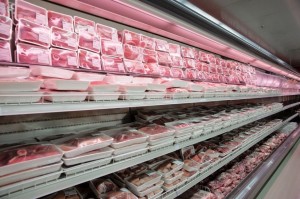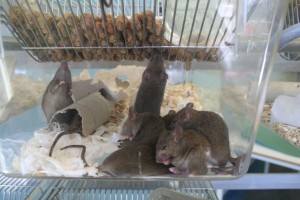Worldlog Tjedan 50 – 2014
Nedavno je istraživanje Chatham Housea potvrdilo: bit će potrebno smanjiti konzumaciju mesa kako bi se zaustavile klimatske promjene. Svjetska proizvodnja mesa pridonosi efektu staklenika više od zbroja svih automobila, zrakoplova, vlakova i brodova. Kako bi spriječili katastrofalne klimatske promjene morat ćemo drastično smanjiti unos životinjskih proteina.
Prošlog sam tjedna tražila od vlade debatu o našoj klimi kako bih skrenula pažnju na činjenicu da moramo smanjiti unos mesa i mliječnih proizvoda. Kad bismo u Nizozemskoj jedan dan u tjednu maknuli meso sa stola, stvorili bismo isti efekt kao da smo maknuli milijun automobila s ceste. Klinki ovdje za više informacija.
Nizozemska je trenutno kao zemlja izvoza vrlo zaposlena kako bi, s ovom ekonomijom, prodala svoje meso i mliječne proizvode. S druge strane, Nizozemska ima mnogo znanja o tome kako osvijestiti druge zemlje o pretjeranom uvozu. Bilo bi bolje da izvozimo klimatska rješenja, a ne probleme!
Usvojeni zakoni o zabrani korištenja štetnih poljoprivrednih otrova još nisu stupili na snagu. Iz toga razloga Stranka za životinje ovog tjedna iznosi plan akcije kako bi ove otrove maknuli iz prodaje. Peticijom smo dosad skupili preko 62,000 potpisa. Vlada je obećala proučiti problem još jednom. Nadamo se da će sada brže poduzeti određene mjere.
Dobre vijesti! Kako opet stiže Nova godina, stigla je i diskusija o vatrometu. Više od dvadeset općina najavilo je da će osigurati zone bez vatrometa i to oko staračkih domova i lokacija na kojima boravi mnoštvo životinja. Stranka za životinje se i dalje bori za zabranu komercijalnog vatrometa.
Vatromet nije jedini slavljenički običaj koji zagađuje okoliš u Nizozemskoj. Ovog smo tjedna pozvali vladu da se aktivno zauzme za zabranu ispuštanja balona u zrak. Državna je tajnica izjavila da je na to spremna. Baloni i trakice nakon ispuštanja završavaju negdje u prirodi, pridonoseći tako plastičnoj juhi u oceanima, a osim toga životinja ih često zamijene za hranu.
Postavila sam i Zastupnička pitanja o različitim lovačkim zakonima u provincijama. Svaka provincija ima svoje zakone, te određene provincije omogućuju neprihvatljive metode lova. Zatražila sam mnogo jasniji i jedinstveniji režim zaštite u novom Zakonu prirode koji od prvog siječnja 2015. stupa na snagu u Nizozemskoj.
Prošle je godine u Nizozemskoj žrtvovano 450,000 testnih životinja za genetičke manipulacije. To je porast od 12,7 posto u odnosu na 2012. Godine 2013. ubijeno je 1,1 milijun životinja. Previše je previše! Zato smo sad pozvali na zabranu genetičkog manipuliranja životinja. Ovo je potrebno kako bi se smanjio broj testnih životinja. Znanstvenici su ukazali na činjenicu da 80% pokusa na životinjama ne zadovoljava osnovne uvjete za kvalitetno znanstveno istraživanje. Svi ovi pokusi moraju se prekinuti što prije!
Pozdrav, Marianne
It was recently again confirmed by a research by think tank Chatham House: eating less meat is needed to stop climate change. Worldwide livestock farming emits more greenhouse gasses than all cars, aircrafts, trains and vessels put together. In order to prevent a catastrophic climate change, we need to reduce our consumption of animal proteins drastically. But the global demand for meat is still growing strongly.
Last week, during a debate on our climate I asked our government to establish a policy for reducing the consumption of meat and dairy products. If everyone in the Netherlands was to abstain from eating meat for one day a week, it would have the same effect as if we would take one million cars off the road. Click here for more information.
At this moment, the Netherlands, as an exporting country, is working hard on forcing its meat and dairy products on emerging economies, while the Netherlands has great knowledge to help countries to withstand floods. We should rather export climate solutions than climate problems!
Previously adopted motions to ban some harmful types of agrotoxics have not been carried out until now. For that reason, the Party for the Animals presented an action plan this week to take those toxics off the market. A petition asking for this has meanwhile been signed by more than 62,000 people. The government has promised to look at it again. Let’s hope they will soon take measures.
Good news! With new year’s eve coming soon, the issue of fireworks is very topical again. Already 20 municipalities have said to make fireworks free zones in the area of nursing homes and places where animals are kept among other locations. The Party for the Animals continues to support the ban on fireworks for private use.
Fireworks is not the only environmental harmful festive tradition in the Netherlands. This week we have called the government to actively discourage sending up balloons. The State Secretary said to be willing to do so. Balloons and ribbons end up as litter in the environment after they have been send up, contributing to the plastic soup in oceans and they are seen as food by animals.
I also asked parliamentary questions about the differences in hunting policies between the provinces. It’s arranged differently in each of the provinces, making the use of animal-unfriendly hunting methods possible in some of them. I have asked for more uniform conservation measures in the new Nature Law, starting on the 1st of January 2015.
Last year, 450,000 test animals were sacrificed for genetic engineering, an increase of 12.7 per cent in comparison to 2012. In total 1.1 million animals were killed in 2013. Much too many! That’s why we called for a ban on the genetic modification of animals. This is necessary to cut back the number of animal tests. Scientists have indicated that 80% of the animal tests fail to meet the basic conditions for good scientific research. Al these tests should be banned as soon as possible!
Until soon! Greetings, Marianne


